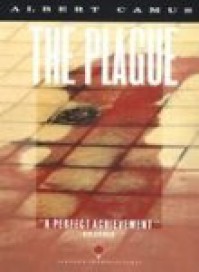Ironic Contradictions
Dr Rieux and The Rats of FEAR

Of all those forces that threaten humanity, there are three which can be seen as the most feared: war, natural disasters and contagious disease. In his work The Plague it is the issue of contagious disease that Albert Camus deals with. It is a novel of philosophy as much as fear and horror, for the story that unfolds is all about what humans do in the face of hopelessness.
There are several reactions that Camus presents in his novel regarding the hysteria and fear attached to an outbreak of the plague. The manner of the disease's unfolding happens within a town where a sense of self-satisfaction and smug happiness exudes from everywhere. Nothing could possibly have gone wrong in such a town, that is until disaster falls. And it is because of the unsuspecting nature of this town Oran, that Camus is able to show multiple reactions.
There is the reaction of the dismissal, the sense of disdain for the signs of plague - to those who react in such a way they mean nothing. For there are always doubters until something hits them right in the face. There is the reaction of fear and panic, which exists in different forms. There are those who hide away in fear, who try to escape the disease and there are those who seek to take their lives and escape it all. Then there are those characters like Dr Rieux who seek to fight the disease, to win against it and save as many lives as possible. These are the heroes of the world, those who see injustice and fight it despite the cost to themselves. And there is a cost by the novel's end both physically, emotionally, spiritually and morally.
Since this was written just around the end of World War 2, one could almost wonder whether Camus was using the idea of plague to point out how people had reacted during the wars. The different reactions, the fear-mongering, the uncertainty of a life that had always been certain before...these are all things seen in the world during the Great Wars. But perhaps it is more correct to say that what Camus notes are human reactions to tragedy in general and that is what we as readers are to take away from the book. That despite suffering there is a choice as to how we react to disaster.
In all regards this is a novel equally as worthwhile now as it was 50 years ago. It is a novel that reminds the reader that life is not as comfortable as it seems, that just around the corner one switch could tip the balance and send you plummeting into chaos. Then comes the time when a rat appears on your doorstep dead and you choose to either recognise it as a sign of plague (physical or moral plague) or to claim that rats do not infest your house at all. The choice of how to respond to events is ours.



 8
8
 2
2
